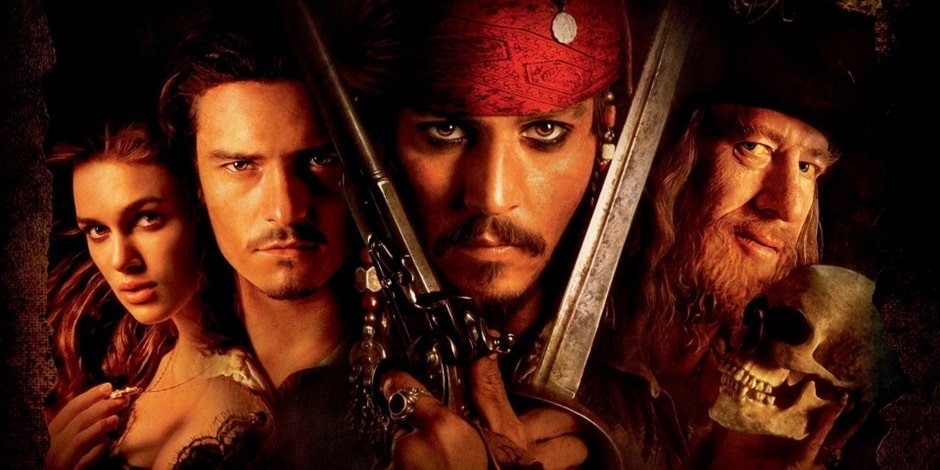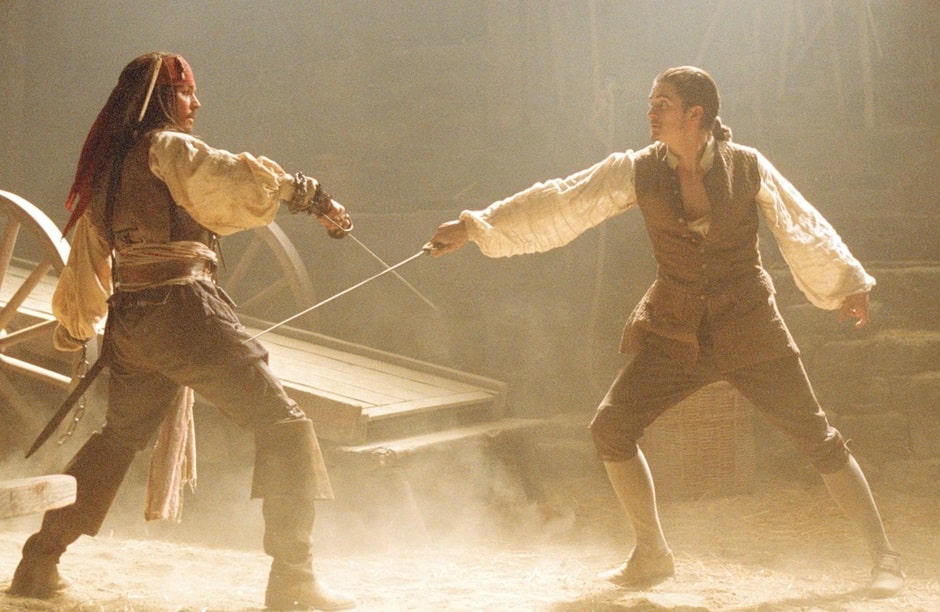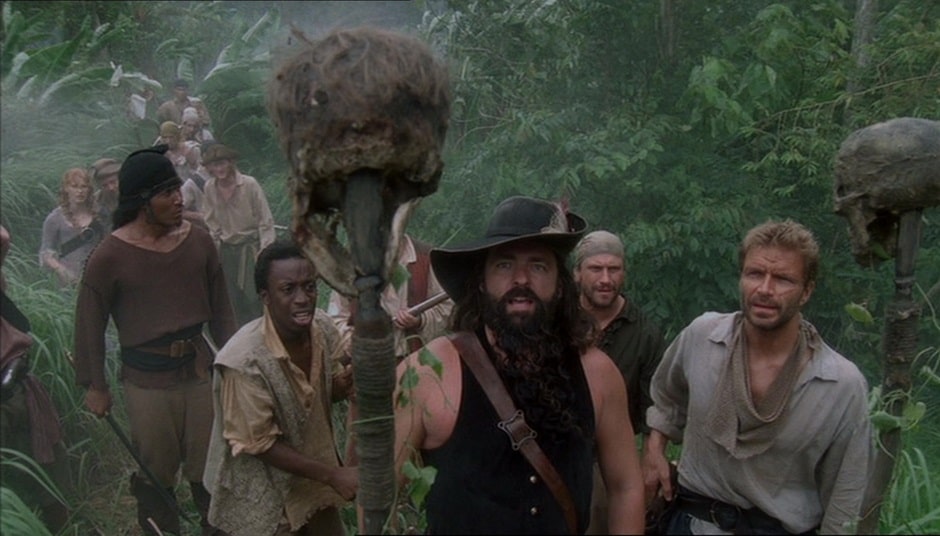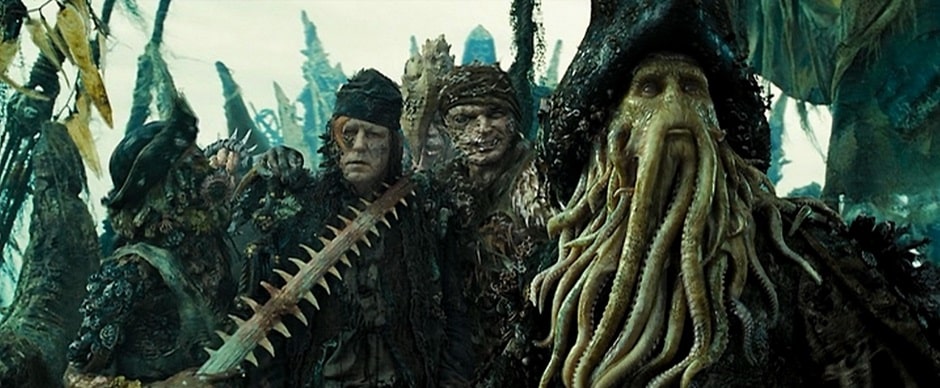Ellsworth’s Cinema of Swords: Pirates Rise from a Watery Grave
Pirates of the Caribbean: The Curse of the Black Pearl (USA, 2003)
It’s hard to remember now, but a mere quarter-century ago, the pirate movie genre was dead and over, ninety years of cheesy swashbuckling and occasional scalawag glory doomed to the ash-heap of history. And then, grinning with malice, pirate films rose like drowned zombies and shambled back to the screen, more raffish and rakehelly than ever. And who do we have to thank for this unforeseen and unholy resurrection? A committee of corporate bean-counters at, of all places, Walt Disney Pictures — damn their eyes!
Pirates of the Caribbean 1: The Curse of the Black Pearl
Rating: ***** (Essential)
Origin: USA, 2003
Director: Gore Verbinski
Source: Walt Disney Pictures DVD
By the turn of the 21st century, the pirate movie was as dead as Blackbeard after he’d been shot, stabbed, and decapitated. But with Pirates of the Caribbean, the genre rose from its watery grave, founding one of the largest-grossing series of all time. How, in the name of all that’s unholy, could such a thing happen?
Through an unprecedented mash-up of genre elements that mixed perfectly yet somehow had never before been combined in quite the same way, that’s how. Let’s strap on a pegleg and thump our way through them.
First, there’s all the traditional tropes of the pirate adventure, as distilled by Robert Louis Stevenson into Treasure Island, turned into scoundrelly cinematic clichés by dozens of Hollywood movies, and reproduced in a beloved boat ride at the Disney theme parks. The Curse of the Black Pearl wallows happily in as many of these tropes as it can shoehorn in, but then it ventures beyond to innovate. The film goes all-in on a tone of self-aware, self-deprecating dark comedic irony previously unseen in Hollywood piracy epics, the closest predecessor being Burt Lancaster’s The Crimson Pirate (1952). Yet for PotC this tone comes from a source outside cinema, namely Ron Gilbert’s classic video game The Secret of Monkey Island and its sequels.
Then there’s the overt supernatural horror element: long toyed-with around the fringes of the genre, ghost pirates being a long-time staple of comic books and TV shows like The Buccaneers and Jonny Quest, it was Tim Powers’ confident combination of voodoo and piracy in his 1987 novel On Stranger Tides that was the origin of the undead pirate crew of the Black Pearl — yes, the same On Stranger Tides that provided the plot for the fourth movie in the PotC series.
But perhaps most of all, it’s Johnny Depp’s thrillingly eccentric performance as Captain Jack Sparrow that elevates Pirates of the Caribbean to the status of cultural hallmark. Antic and affected, Depp provides a characterization utterly unanticipated in the annals of pirate film, as striking as it is unforgettable, not to mention flat-out hilarious. The protagonist of a pirate movie is supposed to be a handsome Tyrone Power-esque action hero, though sometimes he may be afforded a ridiculous comic sidekick. Here, the ridiculous sidekick is the center of the story, while the blandly heroic Will Turner, played by the Tyrone Power-esque Orlando Bloom, is demoted to the role of sidekick. Bold!
Self-aware irony, supernatural horror, a bizarre sidekick-become-hero, these are Black Pearl’s innovations, but they’re supported by a lot of solidly conventional filmmaking that lifts this movie to classic status, making it, as the phrase goes, better than it has any right to be. Most of the other lead performances are quite strong, particularly Keira Knightley as Elizabeth Swann and Geoffrey Rush as the gloriously vile Captain Barbossa. (Could he possibly be having any more fun?)
The supporting cast is a hoot as well, especially the pair of loveable goofballs provided to each crew (Navy, Jack Sparrow, and Barbossa), doofus duos who manage to provide backstory and exposition while repeatedly avoiding gruesome death. Director Gore Verbinski keeps the absurd story clipping along with a tight grip (that he’ll lose on the sequels), seamlessly integrating enthusiastic special effects from Industrial Light & Magic. Add in swordplay by the redoubtable Bob Anderson plus a resounding and instantly classic score by Klaus Badelt and Hans Zimmer, and shiver all me timbers, ye lubbers, pirate movies are back.
Blackbeard (Miniseries)
Rating: **
Origin: USA, 2006
Director: Kevin Connor
Source: Mill Creek Blu-ray
Cable channel miniseries are where rising young actors can first make a mark, and where has-beens on the way down can earn some mortgage money. The has-beens in this Hallmark Channel offering are Richard Chamberlain playing a corrupt colonial governor, Stacy Keach as Captain Hornigold, whose place Blackbeard usurps as master of the Queen Anne’s Revenge, and Rachel Ward as the tough-gal proprietor of a buccaneers’ dive bar. The rising young star, in one of her first roles, is Jessica Chastain as Charlotte Ormand, the governor’s spunky ward who also happens to be a trained physician — the usual thing.
To the tale: this four-hour clunker is presented as a long duel of wits between Lieutenant Robert Maynard of the Royal Navy (Mark Umbers) and Captain Edward Teach aka Blackbeard (Angus Macfadyen), the notorious pirate. These two are nominally historical characters who did in fact have a fatal clash off the coast of the Carolinas in 1718, but the script has no time for history, relocating the action to the Caribbean and tossing in the lost treasure of Captain Kidd to provide a MacGuffin for everyone to chase.
The story is painfully obvious and every plot event is telegraphed well in advance, but it doesn’t matter because Blackbeard is nothing but a TV quickie trying to cash in on the success of the Pirates of the Caribbean franchise. Accordingly, it ticks off as many pirate boxes as possible — buried treasure, walking the plank, kidnapping the governor’s daughter, shanghaiing and marooning, and so forth — while careering around the sea to places with names like Vulture Island (really?).
They did manage to scare up a couple of pretty decent small sailing vessels, a sloop and a bark, for some well-shot ship chases that end in pint-size broadsides. But the cutlass-and-axe boarding actions are just cheesy stage combat that looks about as real as TV big-time wrestling. As for the acting, Leads Umbers and Macfadyen get most of the screen time, which is unfortunate, because neither is better than adequate and quite often worse. The has-beens, at least, know their jobs and chew the scenery effectively, and when Chastain pops in, she lights up the screen with her cinematic presence, regardless of how weak her role and clichéd her lines.
After what seems like forever, they finally dig up Kidd’s hidden hoard and open the long-awaited chest — to reveal the cheapest, most tawdry set of trinkets imaginable. It looks like somebody went down to the Claire’s at the local mall and filled a box with shiny gewgaws. We can take it as a metaphor for this entire tour-de-farce of cut-rate cutthroats.
Pirates of the Caribbean 2: Dead Man’s Chest
Rating: ***
Origin: USA, 2006
Director: Gore Verbinski
Source: Walt Disney Pictures DVD
After the surprise worldwide success of the first Pirates of the Caribbean feature, Disney signed director Gore Verbinski for two sequels, doubling the budget of the first movie for the second. A bigger purse rarely makes for a better movie, and so it proves in this case: there’s a good adventure film somewhere inside Dead Man’s Chest, but it’s almost keelhauled by excess. Action scenes go on too long, jokes fall flat, and unlike the first film, nobody in the cast seems to be having much of a good time. (The exception being Bill Nighy, and we’ll get back to him shortly.)
There’s an endless half hour spent on a cannibal island that’s unnecessary to the story, and unnecessarily racist into the bargain. The only real swordfight in the film is played for laughs, and though it seems funny when three swashbucklers set to atop a rolling water wheel, the joke goes on and on until it’s utterly worn out its welcome — and then it goes on some more. On top of that, new villain Tom Hollander as Lord Cutler Beckett of the East India Trading Company is supremely dull; whenever Beckett comes onscreen, the movie comes to a screeching halt until he’s off again.
And alas, Johnny Depp’s performance as Captain Jack Sparrow, so thrillingly innovative when he was making it up for Curse of the Black Pearl, seems like a retread here, just Johnny Depp playing Johnny Depp playing Jack Sparrow, as it were.
And yet, in between the rehashed gags and Looney Tunes chase scenes, there are tasty morsels to savor in Dead Man’s Chest. For one, there’s the aforementioned Bill Nighy having way too much fun as the wryly acerbic Captain Davy Jones of the Flying Dutchman, every hilarious nuance of his performance coming across despite Nighy being submerged in a full-CGI octopus face. In fact, Jones’ entire crew of undead undersea underlings is a triumph of fantastic visual design and top-notch special effects from Industrial Light & Magic.
The story, though it veers off into incoherent tangents, is built on a sturdy quest structure that keeps drawing the plot back together. The soundtrack, clawed back from protégé Klaus Badelt by master Hans Zimmer, is simply stupendous, arguably the greatest swashbuckling movie score ever recorded. And returning as Elizabeth Swann, Keira Knightley surprises by delivering one of her best performances, out-acting everyone but Nighy and Depp.
Watch out for that cliffhanger ending, though, because Dead Man’s Chest feeds right into its sequel, At World’s End. No plot resolutions for you, ye swab!
Where can I watch these movies? I’m glad you asked! Many movies and TV shows are available on disk in DVD or Blu-ray formats, but nowadays we live in a new world of streaming services, more every month it seems. However, it can be hard to find what content will stream in your location, since the market is evolving and global services are a patchwork quilt of rights and availability. I recommend JustWatch.com, a search engine that scans streaming services to find the title of your choice. Give it a try. And if you have a better alternative, let us know.
Previous installments in the Cinema of Swords include:
Beware of Greeks
Peak ‘90s Wuxia
Ashes of Time
Consider the Rapier
They Seek Him Here…
The Darkness Before the Dawn
Young Horatio Hornblower
Two-Thirds of a Miracle
Wolves and Scorpions
Zhang Yimou
Swords in the Arthouse
LAWRENCE ELLSWORTH is busily promoting the Cinema of Swords compilation from Applause Books, a volume that was born right here at Black Gate! That book, out now, covers swordplay movies up through the ‘80s, but Ellsworth is continuing with new material for a Volume Two and is now working his way up through the 2000s. These later reviews are being published weekly on his new Cinema of Swords Substack blog, at cinemaofswords.substack.com.
Meanwhile, Ellsworth soldiers on at his mega-project of editing and translating new, contemporary English editions of all the works in Alexandre Dumas’s Musketeers Cycle; the seventh volume, Court of Daggers, is available now as an ebook or trade paperback from Amazon, while the eighth, Shadow of the Bastille, is being published in weekly instalments at musketeerscycle.substack.com. The ninth and final volume, The Man in the Iron Mask, will be published early next year by Pegasus Books. Ellsowrth’s website is swashbucklingadventure.net. Check it out!
(Ellsworth’s secret identity is game designer LAWRENCE SCHICK, who’s been designing role-playing games since the 1970s. He now lives in Dublin, Ireland, where he works for Larian Studios and was Principal Narrative Designer for the Dungeons & Dragons videogame Baldur’s Gate 3.)




The Pirates of the Caribbean sequels (well, the first two, at least) remind me of Mummy Returns, where the original film was an unexpected hit, so they greenlit a sequel but focused all of their resources on EPIC! SPECTACLE! rather than a good, y’know, story. But I do still enjoy them for what they are. Despite the utter waste of Chow Yun-Fat in the third.
My current favorite piece of pirate media has to be the Starz TV series Black Flag.
“Aaaa! Don’t eat me! Don’t eat me!”
“I won’t eat you, little bird…”
“Rraagh!” out pops the cannibal and springs a net trap!
I found that SUPER funny, aside from my issues with “Modern” forced attitudes in fiction based more on Parrots I’ve known. They are Raptors that like to kill and eat other birds – those that talk. They imitate the calls of other parrots to get them close enough to kill and eat them. However most parrots were taken as hatchlings and fed fruit and crackers all their lives so they are batsh-t insane wanting MEAT…but not knowing how to express it. That’s why we get the “Polly want a finger…” thing. In this case the bird was luckier in that the Natives probably thought its breed was sacred and didn’t touch it. Also they let it have leftovers. So the birds see a stranger on the island and imitate the sounds they remember from them aka “Nooo! Don’t eat me!” which the Natives appreciate being alerted to be at their traps!
Pirate stories like all major genres come and go. Right now they are waning. IMO if someone likes pirate stories they should MAKE them if an author but do it leisurly not expecting to be published. Then slowly self-publish the refined works (pixels don’t need dead trees) and when there’s an upswing they might get some “Want your thing made into a movie?” treatment. I’ve got a Placeholder for a pirate story in my pulp universe but it’s more based on a different era/type of pirates and an awesome book by a recently passed philosipher I’d better not name.
Congratulations on the 2024 Hugo for Best Game (Baldur’s Gate 3), Mr. Ellsworth!
And I seem to recall someone having a Geoffrey Rush/Bill Nighy level of fun as a foppish pirate captain in a Wilmark Dynasty LARP, many Labor Days ago. Me, I was busy being a parrot.
I always thought that “Cutthroat Island” (1995) was a good movie that was done dirty by timing and the film industry. Might it have prepared the ground for the re-emergence of the pirate flick?
Though, personally, some of my favorite “pirates” are from the movie “Six Days, Seven Nights” (1998), purely because they prompted the line, “Pirates? As in, ‘ARGH’?!”
Great article once again, my favorite Pirate story is “Pyrates” by George MacDonld Fraser. It is a spoof on the genre and the author makes it plain from the outset, but it is full of over the top characters and action and for me it’s just a joy.